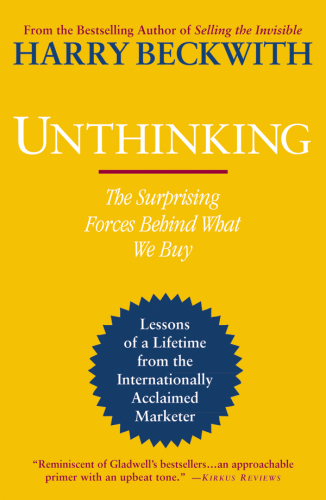
Unthinking
The Surprising Forces Behind What We Buy
کتاب های مرتبط
- اطلاعات
- نقد و بررسی
- دیدگاه کاربران
نقد و بررسی

November 15, 2010
A rumination on the psychology behind our responses to advertisements from marketing expert Beckwith. With our susceptibility determined by our childhoods and culture, much of our response is unconscious. We consistently respond positively to any product that reminds us of play—the iPhone with its bright colors and fun features is a perfect example. We respond to music, to rhyming ads—"it takes a licking and keeps on ticking!"—and gravitate toward the comfort of the familiar; we like Krispy Kreme and Starbucks precisely because they are popular. Despite our continual penchant for optimism and the quest for beauty and convenience, however, we are a fickle, difficult-to-please bunch. While short on practical application, this is a fascinating meditation on the American consumer and the canny marketers in hot pursuit of customers.

November 15, 2010
A marketing expert explains why American consumers buy what they buy.
Beckwith (You, Inc.: The Art of Selling Yourself, 2007, etc.) runs his marketing firm on principles that have attracted more than 20 clients from the Fortune 200, as well as start-up venture-capitalized companies. The author's three basic principles revolve around childhood experiences (the love of play, love of surprise and love of stories); fitting into the overall culture (desire to be individualists some of the time, a part of groups some of the time, and wanting to feel optimistic); and wanting to see beauty in design. Consumer products aim to trigger happiness in potential buyers. After all, Beckwith writes, while the Enlightenment French expressed their goals with the phrase "liberty, equality and fraternity," the new American nation embraced "life, liberty and the pursuit of happiness." Marketers of products cannot rely on logic to sell. Consumers frequently decide based on their feelings rather than on evidence, "then reassemble the facts to support [their] decision." Beckwith opens with an extended example involving the best clutch shooter in professional basketball. The author demonstrates that fans and even professional players believe Kobe Bryant fills that role, when statistics show that he is a misguided choice. The author explains that the reason Malcolm Gladwell's books have become so successful is because he has figured out how to tap in to what American consumers want to read and hear. This book is reminiscent of Gladwell's bestsellers, with the notable difference that Beckwith's interesting stories tend to be much more abbreviated than Gladwell's. Beckwith discusses countless companies and their products, looking at how executives accumulate and lose fortunes through branding and positioning in the marketplace. For example, the author explains why Krispy Kreme doughnuts achieved remarkable popularity, only to then fall out of fashion. For many Krispy Kreme customers, the attraction derived not so much from the taste of the sweets as from the difficulty of finding Krispy Kreme stores. When the doughnuts no longer qualified as a cult item—caused by the corporate decision to sell them at Target and convenience stores—the idea of Krispy Kremes changed and the lure dissipated.
An approachable primer with an upbeat tone, grounded in a mixture of cynicism and shrewdness.
(COPYRIGHT (2010) KIRKUS REVIEWS/NIELSEN BUSINESS MEDIA, INC. ALL RIGHTS RESERVED.)

























دیدگاه کاربران